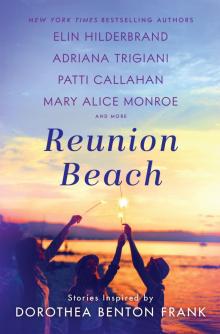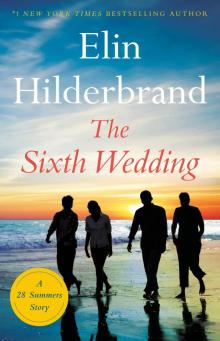- Home
- Elin Hilderbrand
The Sixth Wedding Page 4
The Sixth Wedding Read online
Page 4
“I’ll introduce you around,” Alana says.
“I should probably go find Fray,” Leland says.
Alana laughs. “Let him come find you.”
Which is exactly what happens an hour later. Leland and Mallory are in the library playing a drinking game called Three-Man with two Calvert Hall seniors. One of them, a kid named Penn Porter, drapes his arm over Leland’s shoulders just as Fray walks in.
“Get your hands off her, Porter,” Fray says.
Leland jumps to her feet. “We weren’t doing anything,” she says. She’s so drunk her words are slurred, and Mallory is slumped over on the green velvet sofa, eyes at half-mast. Fray storms out of the library. Leland wants to chase after him but she can’t leave Mallory drunk and alone with two senior boys; that’s how date rape happens.
She appeals to Penn Porter. “Can you help me get her to her feet? She’s Cooper Blessing’s sister.”
Penn rolls his eyes but obliges. He and Leland ease Mallory up. “Are you dating Frazier Dooley? That guy has issues. Seems to me you can do better.”
Leland leads Mallory through the house. She finds Fray in the kitchen, swilling from a bottle of Jim Beam.
“We’re ready to go,” Leland says.
“Great,” Fray says, his eyes flashing with what Leland understands then are his “issues”—rage, jealousy, alcohol. “Ask your buddy Penn to get you home.”
“Fray,” Leland says. “We weren’t doing anything.”
“He had his arm around you,” Fray says, swigging from the bottle again. Just the smell is enough to make the room spin. “I didn’t see you fighting him off.”
“You left me by myself for over an hour!” Leland says. “What did you think would happen?”
He shrugs. “Just goes to show I can’t trust you.”
Leland would like to say that this is an isolated incident, but the entire three years that Leland and Fray date are marked with similar explosions, like firecrackers on a string. She becomes only too used to what she comes to think of as Fray’s “white-hot sulk.”
But there is love too, real love, desperate love, Frazier clinging to Leland, pressing his face into her neck and murmuring, Please, baby, don’t ever leave me.
Now, as Cooper turns down the no-name road that leads to Mallory’s cottage and she sees the ocean glittering in the distance, Leland marvels at how much time has passed—and how much has happened. Leland went on to have a decade-long relationship with a woman. Fray became a billionaire. (A billionaire! What must Penn Porter think about that?) Leland’s father, Steve Gladstone, went on to divorce Leland’s mother and marry Fray’s mother, Sloane Dooley. Technically, now Leland and Fray are step-siblings! These are the kinds of things that only happen in novels. In fact, Fifi wanted to write about it—but Leland put her foot down.
“Where’s Jake?” Leland asks when they pull up to the cottage.
“Inside,” Coop says. “He wanted some time to himself.”
No doubt, Leland thinks. If what happened between her and Frazier is one novel, then what happened between Jake McCloud and Mallory is another. Oh boy, is it.
When they walk in, there’s music playing—Cat Stevens singing “Hard-Headed Woman”—and Jake McCloud is standing at Mallory’s bookshelves, running a finger over the spines.
“I’m glad you’re listening to this song now,” Frazier says. “Get it out of your system so we don’t have to hear it again.”
Jake turns, smiles, and the men shake hands. Leland follows up, hugging Jake and kissing him on the cheek. “Don’t listen to him,” she says.
“Leland, you’re in Mal’s room,” Cooper says.
“You can have Mal’s room,” Leland says to Jake.
“I’m in the guest room,” Jake says. “That’s where I was the first summer.”
“Fray, you can take Link’s room,” Coop says. “I’ll take the sofa.”
Leland carries her bag into Mallory’s room and shuts the door behind her. The room is lovely, with its huge white canopy bed and peach and green attached bath. Leland kicks off her shoes, sits on the bed, and stares at the ceiling. “Can you see us, Mal?” she whispers. “I hope so. I very dearly hope so.”
Jake
He reminds himself that this weekend is for Cooper, not for him.
He also reminds himself that, although it’s Labor Day weekend, it won’t be like any other Labor Day weekend that Jake has spent on this island. Mallory isn’t here, and nobody knows about their rituals but her.
Friday night, they eat at home, just like Jake and Mallory always did—only instead of simple burgers, corn, and sliced tomatoes, Cooper goes to the Nantucket Meat and Fish Market and returns with thick, marbled rib-eyes, blocks of ruby-red tuna, half a dozen twice-baked potatoes, colorful vegetable skewers, a container of Caesar salad, two pies (peach and blueberry), and a container of vanilla Häagen-Dazs.
“And a charcuterie and cheese platter,” Coop says. “In honor of my mother and her penchant for hors d’oeuvres. I also got a case of wine.”
Coop pours glasses of some obscure Riesling that he was tickled to find (Fray has water) and they all go out to the porch that faces the ocean.
Cooper raises his glass. “To Mallory,” he says.
Jake has trouble swallowing. It’s a clear evening, warm and summery. Jake watches the waves curl and crash and he feels that Mallory is here somewhere, but where? In the golden sand, in the soft quality of the light? Jake is sure she would want them to be swimming—they’re not that old, after all, and it’s not that cold. Jake sets his glass down, heads inside to change into his suit, and then goes charging past everyone down the slope of the beach and into the water.
Cooper joins Jake a few minutes later and the two men bob in the waves as they gaze up at Fray and Leland, who are deep in conversation on the porch.
“I just remembered that Mallory told me those two used to have a thing,” Jake says. “‘A thing that refused to die,’ she called it.”
“That was back in high school,” Coop says. “It’s dead, believe me. Long dead.”
“Thanks for inviting me here, man,” Jake says. “I know you didn’t like what your sister and I had going on…”
“You loved her,” Coop says. “That’s all that matters to me. I’m the last person who gets to comment on what kind of relationship is right and what kind is wrong.”
“The minute I realized I’d fallen in love with her, I was right here,” Jake says. “It was maybe year three or four, it was in the morning, and I was swimming when your sister got home from her run. She came out to the porch to stretch and she didn’t see me, so I could appreciate her without her knowing it. And I remember thinking, I love that girl.”
“She had a light inside her,” Coop says. “A funny, innocent light. A good person light.”
“I should have left Ursula and married her,” Jake says. “There were dozens of times I wanted to do it, but I was afraid. I was afraid of life without Ursula, I was afraid your sister would turn me down, and I think we were both afraid that once we were officially together, our love would seem regular, and like regular love, it would die.”
“Remember that one year Mal and I met you at PJ’s at Christmastime and the two of you were dancing by the jukebox? I should have figured out what was going on with you two back then.”
“You should’ve,” Jake says. “But you were too busy chatting up Stacey.”
Coop splashes him. “I’ve got first shower.”
Right before dinner, Jake gets an idea. He searches through the cabinets until he finds a mason jar and then he goes out the back door and snips the last remaining hydrangea blossom off the bush and puts it on the harvest table as a centerpiece.
Now it feels like Mallory is there.
They all sit at the narrow table, which is lit only by votive candles. Jake recalls the year Mallory decided to use tapers and one fell while Jake and Mallory were in the bedroom fooling around and the cottage nearly burned down, and one of the
firemen who showed up was Mallory’s ex-boyfriend, JD.
After he finishes his second glass of wine, he considers telling this story, but it feels too precious to share.
Leland says, “Let’s go around the table and say which of Coop’s wives was our favorite. My favorite was Tish.”
Cooper laughs. He really is a good sport, Jake thinks. “Tish was my least favorite,” Coop says. “She was in love with someone else when she married me—her ‘family friend,’ Fred from San Francisco. They’ve been happily married for over twenty years and have a business flipping houses in Nob Hill. Their daughter goes to Stanford.”
“My favorite was Valentina,” Fray says. “She was a sweet woman.”
“Sweet,” Coop says. “But using me to escape an arranged marriage.”
“Did she go back to Ecuador?” Jake asks.
“Oh, yes,” Cooper says. “I’m not sure if she ended up with Pablo. That was the guy her parents wanted her to marry. I haven’t heard from her in nearly twenty-five years.” He stabs a piece of steak with his fork. “It seems surreal that I could have stood at the altar at Roland Park Presbyterian and taken a lifelong vow to stay with someone and then that person and I split a few months later and I never see or hear from her again.”
Leland digs into her twice-baked potato. “I hate to say this but I can’t even remember who wife number four was. Did I meet her?”
“Tamela,” Coop says. “Poli sci professor at Georgetown. She had three teenagers that took up a lot of her time and energy. One was gender transitioning. Her first husband was killed in a highway crash, the kids were devastated, and they resented me. We eloped in Antigua. That was romantic, but then it was back to reality, and reality was challenging.”
“How long did that one last?” Jake asks. He can’t remember much about Tamela either. He does remember Coop eloping, because Ursula had been relieved to be spared another wedding, and Jake had felt robbed of a chance to see Mallory.
“Two and a half years,” Cooper says. “The irony is that I’m still in touch with the kids. They love me now.”
“Amy was nice,” Jake says. He met Amy at a Johns Hopkins alumni event in DC. She had kind brown eyes and a way of tilting her head to let you know she was really listening to you.
“That was the problem,” Coop says. “Amy was nice, sweet, accommodating, eager to please. There was no mystery, no intrigue, no edge.”
“And that’s what you’re attracted to?” Leland asks. “You fall in love with the edge? The crazy parts, the dangerous parts?”
“I’m not sure,” Coop says, draining his wine. “I’m not sure what’s wrong with me.”
“There’s nothing wrong with you, Coop,” Leland says. “I mean, this group isn’t exactly filled with spokespeople for successful relationships.”
Jake frowns at his plate. It’s true that he and Ursula are divorced—but that they stayed married for so long feels like a success. However, he would say his most successful relationship was the one he had with Mallory. He’s probably deluding himself.
“I notice nobody chose Krystel as his or her favorite,” Fray says.
Coop groans. “Krystel.” He whistles. “In some sense, Krystel is the reason we’re all here. Thirty years ago, when we did this the first time, Krystel called and demanded I come home.”
Oh yes, Jake remembers it well. He’s always wanted to send Krystel a thank-you card. It was because of Krystel that he and Mallory got together.
Cooper says, “I wonder how life would have been different if I’d just ignored Krystel when she called. What if I stayed and went to the Chicken Box like I was supposed to? Maybe she would have called off the wedding, and maybe without making that first mistake, I could have avoided the others as well.” Coop leans in toward the candlelight; his face, now weathered with age and experience, glows a pinkish-orange. “If I’d stayed on the island on this night thirty years ago, so much would have been different.”
Jake nods slowly. He can’t bear to imagine things unfolding any differently than they had. “It’s probably safe to assume things worked out the way they were supposed to.”
“Amen,” Fray says.
“Well, I’m not sure about you guys,” Coop says, standing up and tossing his napkin on his plate, “but I’m not missing out on the Chicken Box tonight.”
The Chicken Box looks exactly the same: the concrete floor is sticky with beer and there’s a crush of people at the bar. The only difference between now and the first time Jake set foot in the place in 1993 is that now, every single person is holding a cell phone. The band is on stage singing “Just the Two of Us,” by Grover Washington, Jr., a song so old it’s new again, apparently, and up front there’s a group of people dancing and taking videos of themselves dancing.
Leland and Fray opted to stay home, so it’s just Jake and Coop on this nostalgic adventure. They’re by far the oldest people here. They are gray-haired geezers, and Jake trains himself to keep his eyes off the scantily clad girls his daughter’s age.
“I’m going up front to dance,” Coop says.
“Have fun,” Jake says. “I’ll be at the bar.” He chooses the less populated side, over by the pool tables, where there’s a bit of breathing room. It takes so long for the bartender to notice him that when she finally does, Jake orders four Coronas, two for him and two for Coop. Cooper, however, is nowhere to be seen and Jake doesn’t want to try moving four beers through this crowd, so he stays put and starts drinking.
A female voice says, “I’ll give you twenty bucks for one of those.”
Jake turns. There’s a woman in a white T-shirt and cut-off jean shorts with a long blond braid standing next to him. She’s in her forties somewhere, maybe even her late forties, though he’d be too afraid to hazard a guess.
“Have one,” he says. “Please, my treat.”
“You’re my hero,” she says. She takes one of the cold bottles and rolls it across her forehead. “It’s my girlfriend’s birthday and she dragged me here. It’s fun to dance but it’s hard to not feel completely geriatric.”
“Tell me about it,” he says. He offers his hand. “I’m Jake.”
She has a nice, firm shake. “Brooke Schuster,” she says. “You look familiar to me for some reason. Have we met before?”
Jake stares at the lime wedge choking the neck of his bottle. “No, I don’t think so.”
“Are you sure?” she says. “Because I swear…”
“I’m Jake McCloud,” he says, and when that doesn’t clear up the confusion on her face, he adds, “My ex-wife, Ursula de Gournsey—”
Brooke snaps her fingers. “Yes! That’s where I know you from.” She takes a sip of her beer. “Well, if it makes a difference, I voted for her and I was sorry to see her lose.”
“Everything in life works out as it should,” Jake says.
“Spoken like a man who wants to change the subject,” Brooke says. “And I can’t blame you. What are you doing here at the Box?”
“Ah,” Jake says. “Reliving the past with a buddy of mine from college.” He takes another quick look at Brooke. She’s pretty, he decides, and the cut-off shorts are giving him strong Mallory vibes. He checks her left hand—she’s wearing a lot of silver but nothing that looks like an engagement ring or wedding band. So here it is, finally—an opportunity to have a conversation with a grown woman in real life. He can practically hear Bess urging him along: Come on, Dad, you have to get back out there! But dating, or even chatting up someone, feels like so much effort—getting to know someone from scratch, starting all over with personal histories, figuring out what makes someone else tick—he’s not sure he’s up for it.
Brooke sets her beer firmly down on the bar. “I’ll probably regret saying this in the morning, but I had something of a celebrity crush on you.”
“On me?” Jake knows he sounds surprised, though he’s aware there was a small part of the female electorate across the country who turned a Jake McCloud crush into a thing. (There had been an a
rticle in The Cut entitled “The Very Real Sex Appeal of Mister UDG.”) At nearly every event Jake did on behalf of his wife, someone would slip a note to him or brazenly approach his security detail, asking for a “private meeting.” Jake always told Ursula about these overtures and when she could spare a few moments of her attention, she would pat his cheek and say, “I’m well aware how appealing you are, the adoring, devoted husband, handsome and well-spoken, and I’m grateful.” This patronizing response had stoked Jake’s resentment—Ursula only cared about how Jake’s persona reflected on her—but Jake had continued to be up-front about every woman who approached him, in the name of propriety.
Brooke says, “You’re the executive director of the CFRF. And my nephew, Charlie…” She stops and her eyes shine with tears. “We lost him to cystic fibrosis a few years ago.”
“I’m so sorry,” Jake says. “And I didn’t mean to be flip when I said everything works out the way it’s supposed to. In my business, I know that’s not the case. How old was he?”
“Twenty-six,” Brooke says. “He was my sister’s only child.”
“That’s so difficult,” Jake says. “I lost my twin sister to CF when we were thirteen.”
“I know,” Brooke says. “I read the profile of you in Time. I just want you to know how grateful I am for all the work you’ve done, the money you’ve raised for research. You became my sister’s personal hero.” When she blinks, a single tear rolls down her flushed cheek. “I can’t believe I’m talking to you here, at the Chicken Box.”
Jake wants to take the conversation in a lighter direction, but how? He has no experience talking to women like this, as evidenced by the fact that Brooke is now crying. “Do you live here year-round?”
“I do,” Brooke says. “I teach English at the high school.”

 What Happens in Paradise
What Happens in Paradise Reunion Beach
Reunion Beach The Sixth Wedding
The Sixth Wedding 28 Summers
28 Summers Summer of '79: A Summer of '69 Story
Summer of '79: A Summer of '69 Story Troubles in Paradise
Troubles in Paradise The Perfect Couple
The Perfect Couple Winter Solstice
Winter Solstice Barefoot: A Novel
Barefoot: A Novel